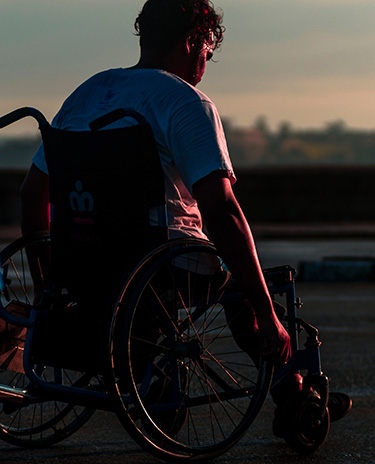Many health care providers lack confidence in their skill and ability to discuss sexuality and intimacy concerns with men who have experienced a spinal cord injury. This is one of the key findings of a comprehensive study of sexuality in men with spinal cord injury undertaken by newly minted York PhD Jacqueline Kathnelson.

Working under the supervision of Faculty of Health Professors William Gage, Christine Kurtz Landy and Hala Tamim, and Brock University Kinesiology Professor David Ditor, Kathnelson interviewed men between the ages of 18 and 50 who have experienced a spinal cord injury to learn more about the kinds of supports they need to move forward with their lives. Informed by insights gained from the interviews, Kathnelson developed a survey to further assess 65 different aspects of sexuality identified in the interviews.
Using the Delphi Method, multiple rounds of the survey were completed by men living with a spinal cord injury to reach a consensus on those aspects. A similar survey was then delivered to health care providers treating men with spinal cord injury who also completed multiple rounds of the survey to reach a consensus on those aspects. She used the findings from the surveys to develop an agreement on what is needed to effectively address concerns of both patients and their health care providers on the topic of sexuality following spinal cord injury.
Through this comprehensive approach, Kathnelson established a much-needed 360-degree view of what men and their health care providers need to consider in order to have an open, thoughtful conversation about sexuality and intimacy following a spinal cord injury. Her work has effectively removed taboos around the topic and revealed important considerations that will help men with this devastating injury lead full and vital lives.
“The men who participated in the research said that their health care providers are not talking to them about sexuality,” said Kathnelson, who recently defended her dissertation on the subject. “So, it is easy to assume that health care providers don’t think that sexuality is a priority for these patients.
“However, it has been established across the literature that sexuality and intimacy are priorities for patients. I would say that based on the research that health care providers aren’t addressing sexuality because they don’t have the skills to discuss sexuality after spinal cord injury. They don’t know how to discuss it or tackle intimacy concerns because they haven’t been trained.”
Kathnelson says that for many health care providers, it is difficult for them to know whose role it is to address sexuality with men after a spinal cord injury and they are not confident enough to have those important conversations with their patients. Uncertainty is amplified as treatment and support of patients with spinal cord injury requires a vast, multi-disciplinary team. “There needs to be health care education for all members of the health care team working with these patients, it is not a role for just one health care provider,” she says.

A psychologist, says Kathnelson, might discuss body image issues and how that affects sexuality after a spinal cord injury. A fertility specialist could talk to a patient about certain aspects of sexual function after a spinal cord injury and how it relates to having children, while a medical doctor should look at giving patients medications and guidance on how to safely use the medications. An occupational therapist, physiotherapist or nurse could discuss positioning during sex and different adaptive things that men can undertake. “Everyone needs to play a role and have sexual health included in their education and training,” says Kathnelson. “It also needs to be a part of their job description to talk about sexuality as it relates to their health care specialty.”
Another important finding that came out of her research was that for many of the men who took part in the surveys, there was a deep and impactful shift in the perspective and meaning of sexuality from being a physical act to an evolved significance where it was more important to be connected emotionally and psychologically with their partners. “It was important to the men to experience the intimacy, psychological and emotional aspects of sexuality,” she says, noting that this shift needs to be included in health care provider training.
“It is extremely difficult to look at sexuality holistically when dealing with spinal cord injury because in a sensory perspective, the brain is literally disconnected from the body,” she observes, adding that this aspect has changed her perspective.
Any protocol or recommendations for multidisciplinary teams treating men with spinal cord injury should be developed in partnership with the patients, says Kathnelson. “Many of the results from the men’s Delphi surveys in comparison to the health care providers’ Delphi surveys revealed that aspects of sexuality that health care providers considered to be very important were not really important to the men.
“When we are developing education plans and delivering programs, both the materials and programs need to be co-created with the patients so that they are receiving useful information,” she says. By comparing the results of the surveys, Kathnelson was able to identify the gaps that need to be filled so that there is an alignment between health care providers and patients. “Health care providers will be able to support their patients because they will have a better understanding of their needs.”
Over the past year, Kathnelson has published her findings in three separate papers in leading journals. Each of papers addresses a different aspect of sexuality and intimacy concerns in men with a spinal cord injury. “Examining the psychological and emotional experience of sexuality for men after spinal cord injury” was published in Cogent Psychology. The paper “Supporting sexual adjustment from the perspective of men living with spinal cord injury” was published in Spinal Cord, a publication available on nature.com. “Utilizing the Delphi Method to Assess Issues of Sexuality for Men Living with Spinal Cord Injury” can be found in the journal Sexuality and Disability.
By Jenny Pitt-Clark, YFile editor
To learn more about Research & Innovation at York: follow us at @YUResearch; watch the animated video which profiles current research strengths and areas of opportunity, such as artificial intelligence and Indigenous futurities; and see the snapshot infographic, a glimpse of the year’s successes.
